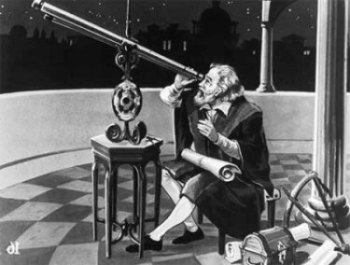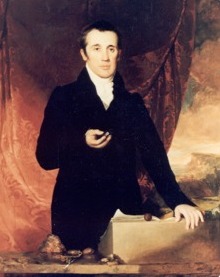
I want to thank you for coming tonight. I count it a privilege to speak about three of the loves of my life: science, mathematics, and Jesus Christ. Now there are many people who have a hard time putting these three together, but I have a hard time separating them, and I think that you will understand why by the time I am done this evening.
The idea that faith in God and scientific reasoning are separate and incompatible realms has gained wide acceptance in recent years in our culture. But it was not always so, and there are many who do not agree with that separation today. Beginning in the “Enlightenment” of the 1600’s and 1700’s, men such as Voltaire, Hume, and Locke sought to replace faith in God with faith in man. What Jaan Vaino spoke regarding his astronomy professor, and certainly what I have heard from some of my own professors, is that faith in man has been substituted for faith in God in much of academia.
The claim of the Enlightenment was that science had provided the proof that God was unnecessary. The “religious” ages that preceded the Enlightenment were labeled as the “Dark Ages,” a label I remember from my classes when I was in school. It was not until the 1990’s that this label was discredited and removed from the teaching of history, because the years the Enlightenment described as the Dark Ages were anything but. Nevertheless, the tendency today is to ignore that many of the major scientific breakthroughs that occurred before, during, and after the Enlightenment were made by men who were serious believers in God. In the words of Peter Gay, “science could give the deists and atheists great comfort and supply them with what they wanted—Newton’s physics without Newton’s God.” (Stark, 166-7) I will go into the issue of Newton’s God later on.
Such anti-religious thinking prevails in much of academia today. A 1981 resolution of the Council of the National Academy of Sciences declared, “Religion and science are separate and mutually exclusive realms of human thought whose presentation in the same context leads to misunderstanding of both scientific theory and religious belief.” (Johnson, 125) Granted, there are matters in the realm of religion, and some in the realm of science, that are purely human imagination. But, separating the knowledge of God from the study of the universe He created is like separating our knowledge about Leonardo da Vinci from the study of the Mona Lisa. Why should we only look at what has been made—and ignore the nature and motivation of the One who created all things?
Cornell Professor William Provine, a leading historian of science, gives voice to views that many hold today. He insists that conflict between science and religion is inevitable, a declaration that I have often heard in the academic realm. He insists that those who hold on to religious beliefs while accepting evolutionary biology “have to check [their] brains at the church-house door.” I thank God that I neither had to check my brain at the door of church, nor in my organic chemistry class at Yale. Provine also states, and please listen to these words because they are echoed on many campuses today, “Modern science directly implies that the world is organized strictly in accordance with mechanistic principles,” mechanistic meaning simply a machine, just motions taking place. “There are no purposive principles whatsoever in nature. There are no gods and no designing forces that are rationally detectable…. Second, modern science directly implies that there are no inherent moral or ethical laws, no absolute guiding principles for human society.” (Johnson, 126)
 The Milky Way
The Milky Way
I would like to ask you tonight, do you really believe these claims? Do you really believe that there are no absolutes whatsoever? It is much in fashion in the university to say that there are none, but when there are no absolutes, we are in great danger. That is when men like Adolph Hitler and Joseph Stalin arise. When there is no one to say, “This is wrong,” evil often prevails.
The Nobel-prize-winning chemist and evolutionist Jacques Monod claimed, “Chance alone is at the source of every innovation, of all creation in the biosphere. Pure chance, absolutely free but blind, is at the very root of the stupendous edifice of creation.” (Berlinski, 22) Students today are told that these are the facts, and contrary views are dismissed. This past July, Daniel Dennett wrote an op-ed piece in The New York Times entitled “The Bright Stuff,” and this is what he wrote. “What is a bright? A bright is a person with a naturalist as opposed to a supernaturalist world view. We brights don’t believe in ghosts or elves or the Easter Bunny — or God.” (Op-Ed, “The Bright Stuff,” 7/12/2003) But they do believe that the universe was created by blind chance, and that to me is harder to believe than all the rest!
Years ago, I was proctoring an exam at the school where I teach here in New York City. I only had three or four girls in that large room, so there was no possibility of any of them cheating. So I sat on top of my desk, and someone had left a Bible there. I started reading the Bible, peering up every couple of minutes, making sure out of the corner of my eye that they were behaving. It was an uneventful exam, but when I got to the end of it, the girls almost threw their papers at me and ran out the door! I was left wondering, “What on earth is going on here?”
I walked down to the math office a little worried, this being my first year at the school. The students were talking to my boss, the math department chair. They were whispering, but walked out of the room when I arrived. I strode up to the department chair and said, “What was that all about?” She responded with a smile, “Well, they came up to me, ‘Dr. Peeler, Dr. Peeler! Do you know what Mr. White was doing during our math exam?'” And Dr. Peeler said, “No, what was he doing during your math exam?” “Mr. White was reading the Bible!” And Dr. Peeler said, “So?” And the students said, “Can you imagine anyone intelligent reading the Bible?” Dr. Peeler sat back in her chair and said, “Girls, I read the Bible all the time.”
Now this happened at a Catholic school! What is it like in a secular school? I am talking about what the girls actually get as a message from the culture, certainly not from the school where I teach. At my school, we talk about God all the time, but our culture and especially academic culture, disparages the idea of intelligent people believing in God. In fact, in the modern university, Christianity is often singled out as an impediment to the advancement of scientific knowledge. Students who hold on to a personal faith in God are criticized in their college classrooms. And I am not saying this in theory, I am talking about facts. I have been involved for 30 years in Bible studies at Yale, Columbia, and for a few years at Princeton. I have known many students who have been called on the carpet publicly for their beliefs by their professors.
Last year, Dr. Ernst Mayr, professor emeritus of zoology at Harvard, told The New York Times the story of a colleague at the University of California. The professor in California gave his class a questionnaire at the beginning of a course on evolutionary biology. These were the questions: “Do you believe in God? Do you believe in the Christian God?” (It did not say the Buddhist God, or the Hindu God. It said, “Do you believe in the Christian God?”) “Do you read the Bible? Do you believe every word in it, literally?” Every student in that course had to fill out that questionnaire. But the professor said that what surprised him was that, at the end of the course when he gave out that same questionnaire again, the vast majority of those who had said “Yes” to the questions at the beginning of the course said “Yes” at the end of the course, they still believed in God. (“An Insatiably Curious Observer”, The New York Times, 4/16/02) And Ernst Mayr went on to criticize not the dogmatism of the professor, but of the students who held onto their personal faith in God!
On the other hand, two dear friends of mine from Yale, who are now married and working in inner city medicine in Chicago, were in their Introductory Biology course together with about a hundred and fifty other students. The professor asked the class, “How many people here believe that God created man?” Just a few hands went up, five or six including my two friends. Now I can guarantee that in classrooms at Yale or Columbia many more than 5 or 6 out of a hundred and fifty believe that there is a God, but they are intimidated from saying so. Yet the professor turned it around and said to the class, “I have to admit that it takes as much faith to believe in evolution as it does to believe that God created man.” That was an honest professor!
I would like to give a little historical perspective tonight on the whole relationship between science and religion. The modern so-called “war” between Christianity and science is highly ironic when you take the larger view of the history of science and mathematics. In his recent book, For the Glory of God, Rodney Stark points out that, “the claim of an inevitable and bitter warfare between religion and science has, for more than three centuries,” going back to the Enlightenment, “been the primary polemical device used in the atheist attack on faith.” This has been especially true on the campuses. “From Thomas Hobbes through Carl Sagan and Richard Dawkins, false claims about religion and science have been used as weapons in the battle to ‘free’ the human mind from the ‘fetters of faith.'” (Stark, 123) I do not know about you, but faith in Jesus Christ has never been a fetter to me. Jesus Christ broke my fetters and even helped me when I was studying organic chemistry! It is not an easy subject as there is a lot to memorize. But I can also tell you that those molecules cried out to me about the glory of God, the glory of God in an ethanol ring, for example. You can go down any list of chemicals and see order and more order—everywhere you look there is order and design in chemistry.
One of the chief “weapons” used today to discredit belief in God is Darwinian evolution. Regarding Darwin’s claims, one biologist recently wrote, “It is just a matter of time before this fruitful concept comes to be accepted by the public as wholeheartedly as it has accepted the spherical earth and the sun-centered solar system.” Now I grant you that it would be hard to find an American today who believes in a flat earth, or that the earth is the center of the universe! But even The New York Times admits that about half of the American public has serious doubts about Darwinian evolution! (“Darwin vs. Design,” The New York Times, 4/8/01)
What is going on here? Step back in history for a moment and look at the story that is being told! The debate between a flat earth and a spherical earth, and an earth-centered vs. a sun-centered solar system, are oft quoted examples of the wisdom of science contrasted with the ignorance of religion…. That is what I heard when I was in school, but is the story true?
 Christopher Columbus
Christopher Columbus
Christopher Columbus is described today as an adventurer who was opposed by a religious society that believed the world was flat. How many people here tonight have heard that Christopher Columbus was up against people who believed the world was flat? Am I the only one who has heard this tale? The main problem is that it simply isn’t true! If anything, the educated people of his time, the wise men of Spain who were advising Isabella and Ferdinand against funding the voyage, did so not because they believed the world was flat, but because they rightly believed that Christopher Columbus was greatly underestimating the circumference of the earth. While he thought that the distance from the Canary Islands to Japan was about 2,800 miles, they insisted that it was more like 14,000 miles. If the New World had not been there, we would have never heard from Christopher Columbus again! (Stark, 122) He was not sailing for the New World—he thought he was sailing for Japan! If he had had 14,000 miles to go, he never would have made it!
Wherever else the idea of a flat earth came from, it did not come from the Bible! The spherical nature of the earth, not a flat earth, was described in the book of Isaiah around 750 BC. “He sits enthroned above the circle of the earth, and its people are like grasshoppers.” (Isaiah 40:22) The Hebrew word for circle is “khoog,” and it means circle, or compass, or circuit. It is a word that is used only once in the Bible, and it can also be used for sphere.
Also, the fact that the earth hangs in space, not on the back of elephants as some ancient pictures have described, with no physical supports underneath, is described in the oldest book of the Bible, the book of Job: “He spreads out the northern skies over empty space; he suspends the earth over nothing.” (Job 26:7) The Hebrew word is “bel-ee-máh” which literally means “nothing whatsoever.” The ancient Greeks insisted that space could not possibly be a vacuum, but Job most likely lived more than a thousand years before the ancient Greeks!
 William of Ockham
William of Ockham
As for the sun-centered universe, contrary to modern claims, Nicolaus Copernicus was not the first European to discover that the sun was the center of the universe, and yet that is the way the story is often told. He was trained in some of the best Catholic universities of Europe where scholars had been working on just such a viewpoint for hundreds of years. (By the way, the university was not a secular invention! Columbia, Yale, Harvard, Oxford, Cambridge, and many others were founded by devout believers in God. They wanted to have places to search out what God had done from beginning to end.) The Franciscan scholar, William of Ockham, proposed that space is a vacuum 150 years before Copernicus. He wrote that the heavenly bodies, once set in motion by the will of God, would continue uninterrupted because there is no friction in space. By contrast, Copernicus insisted that there were huge rotating shells that held the planets in place. (Stark, 138-9) Yet Copernicus is described today as the great hero who triumphed over religious persecution and ignorance!
The fact is, and this is one of the points I hope you will understand tonight, that not only was Christian teaching not opposed to science, “Christian theology was essential for the rise of science in the western world.” (Stark, 123, emphasis added) That is something not many people know today. Modern science arose in Europe and in Europe alone, beginning long before the Renaissance, precisely because the universe is declared in the Bible to have been created by a God who is orderly and reasonable. Predictable, scientific order can only be found when you expect to find it.
As Stark puts it, and he is not the first to point this out, “Christianity depicted God as a rational, responsive, dependable, and omnipotent being and the universe as his personal creation, thus having a rational, lawful, stable structure, awaiting human comprehension.” In 1925, in one of his Lowell Lectures at Harvard, Alfred North Whitehead pointed out that science arose in Europe because of the widespread “faith in the possibility of science… derivative from medieval theology.” His words shocked many of his contemporaries, but they are historically accurate. (Stark, 147)
The “gods” of the ancient Greeks were anything but reasonable and orderly, which is why the Greeks never went farther than they did with their early forms of math and science. I am impressed with Greek math, but it stayed in the realm of theory and never came far into the real world—with the exception of someone like an Archimedes—precisely because of the disorderly nature of the gods the Greeks believed in. The same could be said of other pagan and polytheistic gods and the cultures which worshipped them. Even to Chinese philosophers, the universe “simply is and always was,” something that many secular Western scientists believed up until the 1920’s, when the “Big Bang” came along. As one scholar wrote, “It was not that there was no order in Nature for the Chinese, but rather that it was not an order ordained by a rational personal being, and hence there was no conviction that rational personal beings would be able to spell out in their lesser earthly languages the divine code of laws….” (Stark, 151) The Chinese made great advances in science in many areas, and they still have great scientists today. But because in times past they did not believe in a universe that was ordered by a rational God, they were not looking for a rational order. Predictable, scientific order can only be found when one expects to find such order. Why would anyone waste their time looking for something that they truly believed did not exist?
If European scientists had also believed that the universe was irrational and unpredictable, modern science might never have arisen! But, as many western scientists and mathematicians have noted over the centuries, the Bible gives a very different view of the universe. Listen with me for a moment to Psalm 19. It is one of my favorite Psalms, and I think you will understand why:
I did not grow up in New York City. I grew up in farm country in northeastern Massachusetts where you can actually see the stars. I can remember moonless nights, standing out in a field, and looking at the vast number of stars. I don’t care how you put it, that is a religious experience, because the stars themselves declare the glory of God. I did not know Jesus then, but I did understand as a little boy that these things were not accidents, someone put them there! The large majority of the great names in western science and math were believers in the rational, all-powerful Creator described in the Bible. For the sake of brevity, I will consider just a few of them.
 Galileo Galilei and his telescope
Galileo Galilei and his telescope
Galileo Galilei wrote, “The book of nature is a book written by the hand of God in the language of mathematics.” (Stark, 165) Forgive me, I am a mathematician and I totally agree with him. And God Himself is a mathematician because so much of what He has done, He has done mathematically. Galileo also wrote, “Mathematics is the language with which God has written the Universe.” Note that he is speaking about nature, not religion! That is what impresses me about this statement. Too many of us today confine the God who made the universe to Saturday or Sunday mornings and institutional religion! But the God who really is, is far larger than human religion!
Johannes Kepler stated, “The chief aim of all investigations of the external world should be to discover the rational order and harmony which has been imposed on it by God and which He revealed to us in the language of mathematics.” This is a mathematician and a scientist saying that the chief purpose of my life is to find out what God did. Even Nicolaus Copernicus, by the way, was deeply a religious man.
And what about Sir Isaac Newton? The Enlightenment sought to portray Newton as one of their own, Voltaire calling him the greatest man who ever lived. David Hume described him as “the greatest and rarest genius that ever rose for the ornament and instruction of the species.” (Stark, 167) Harvard’s Stephen Jay Gould recently used similar words in an article about Newton in Nature magazine. But the great mathematician himself wrote the following words, “The true God is a living, intelligent, powerful Being…. he governs all things, and knows all things that are done or can be done.” This is not a God who is a clockmaker who makes all things and then walks away from His universe. This is a God who knows all and rules all. In Newton’s words, “He endures forever, and is everywhere present.” (Stark, 168) This is not a God who does not care about you and me; this is a God who knows you and me and even “calls the stars by name.” That was the God that Newton believed in.
In his letters to Richard Bentley, Newton “ridiculed the idea that the world could be explained in impersonal, mechanical terms.” As Stark points out, “Having discovered the elegant lawfulness of things” (I teach calculus. Isn’t it amazing that the motion of objects can be explained by simple equations? Why can you send the Voyager spacecraft out there? Because equations allow you to program where that spacecraft will go, and to model exactly where the planets are. The planets are always where they are supposed to be, unlike some of us!), “Newton believed he had, once for all, demonstrated the certainty that behind all existence there is an intelligent, aware, omnipotent God. Any other assumption is ‘inconsistent with my system.'” (Stark, 168) Yet the Enlightenment sought to use Newton as a good example of someone who did not believe in God. You can read his diary—this was a man who believed in God!
Isaac Newton was one of the most brilliant mathematicians of all time. He studied an amazing array of subjects. Yet, though he was a proud and somewhat eccentric man—some mathematicians are a little eccentric—he never lost sight of how little he knew in comparison to the Almighty: “I don’t know what I may seem to the world, but, as to myself, I seem to have been only like a boy playing on the sea shore, and diverting myself in now and then finding a smoother pebble or a prettier shell than ordinary, whilst the great ocean of truth lay all undiscovered before me.” (Brewster, Vol. II, Ch. 27) Whose truth was that? The truth of the Almighty! Newton’s candor is refreshing, especially in light of some of the intellectual arrogance that is so common in our generation.
.jpeg) Classification of Plants by Linnaeus
Classification of Plants by Linnaeus
Carolus Linnaeus, often called the “Father of Taxonomy,” was also a devout believer in Jesus Christ. In the 1700’s, he developed a system for naming, ranking, and classifying organisms. Combining one Latin name for the genus and another for the species, he greatly simplified and standardized the classification system used ever since in biology. As the University of California at Berkeley’s web site points out, “Linnaeus loved nature deeply, and always retained a sense of wonder at the world of living things. His religious beliefs led him to natural theology, a school of thought dating back to Biblical times but especially flourishing around 1700: since God created the world, it is possible to understand God’s wisdom by studying His creation.” In Linnaeus”s own words, translated from the Latin, “The Earth’s creation is the glory of God, as seen from the works of Nature by Man alone.” I like gardening, too. It is not just calculus that declares the glory of God, a tulip can do that as well.
Linnaeus’s strong religious beliefs, by the way, recently provoked some biologists at Yale to propose that his system of classification based on physical structure be completely replaced with one based on evolutionary theory. Put out the structure and the facts, and bring in the evolutionary theory! I am reminded of the experience of two friends from Yale who are now medical doctors. One learned classical human anatomy in medical school, and found it served him well when he actually became a doctor. The other learned evolutionary human anatomy, but found it useless in practice, and ended up having to teach himself classical anatomy.
Leonhard Euler was also a deeply devout Christian, and one of the greatest mathematicians ever, writing more on the subject than any person in history. Searching out what He viewed as the handiwork of the Creator, he made large bounds forward in the study of analytic geometry, trigonometry, calculus, number theory, continuum mechanics, lunar theory, acoustics, the wave theory of light, hydraulics, music, and other fields. As Ball’s History of Mathematics states, Euler “revised almost all the branches of pure mathematics which were then known, filling up the details, adding proofs, and arranging the whole in a consistent form. Such work is very important, and it is fortunate for science when it fall into hands as competent as those of Euler.” (Ball, 4th Edition, 393)
Another expert on his life stated, “Euler was the first to appreciate the importance of introducing uniform analytic methods into mechanics, thus enabling its problems to be solved in a clear and direct way.” If you don’t understand what that means, suffice it to say that the car you drive, the ship you travel in, and the plane you fly all owe the possibility of their design to methods of problem solving that Euler pioneered in the 1700’s. Expecting order in Creation, he found order, and greatly advanced both science and math.
 Benjamin Silliman
Benjamin Silliman
Professor Benjamin Silliman of Yale is generally viewed as the father of American scientific education. Yet, to use the words of a recent Yale president, A. Bartlett Giamatti, he was an “evangelist of science and of the Gospel” of Jesus Christ. In his Reminiscences Silliman wrote, “I can truly declare, that in the study and exhibition of science…, I have never forgotten to give all the honor and glory to the infinite creator, happy if I might be the honored interpreter of a portion of his works….” (Fisher, 23)
Even Albert Einstein told a fellow scientist in 1921, “I want to know how God created this world…I wantto know His thoughts, the rest are just details.” (Stark, 196) I would like to ask you tonight, do you want to know God’s thoughts? Most of us assume that we cannot, but the fact of the matter is that we can, and I will go into why in a minute.
By the way, surveys of American scientists done in 1914, 1969, and again in 1996 show that “a substantial majority think of themselves as moderately or even deeply religious,” mathematicians being the most religious of all. (Stark, 194) Many of them, like those students at Yale, are intimidated into not talking about what they believe, but they are present on the campuses.
And what is our conclusion tonight? When we consider the real accomplishments of modern science, historical perspective and a little humility are in order! Isaac Newton had the wisdom to write to Robert Hooke, “If I have been able to see further, it was only because I stood on the shoulders of giants.” But scientists and professors today who claim that everything is the result of blind chance are perfectly willing to stand on the shoulders of giants like Newton, Linnaeus, and Euler—and ignore the fact, and never tell their students, that these men believed in God.
With timeless wisdom, Newton also once remarked, “To explain all nature is too difficult a task for anyone man or even for any one age. `Tis much better to do a little with certainty, and leave the rest for others that come after you, than to explain all things.”
Only God can explain all things! Only God can explain all things, the claims of some modern scientists notwithstanding! As the Apostle Paul wrote in 1 Corinthians 13:9-10, “For we know in part and we prophesy in part. But when that which is perfect has come, then that which is in part will be done away.” We know in part, but God knows all, and He knows us!
The Bible declares in Proverbs 9:10, “The fear of the LORD is the beginning of wisdom, and the knowledge of the Holy One is understanding.” Do you know that this verse is one of the foundational verses of most of the Ivy League universities? “The fear of the LORD is the beginning of wisdom.” It is not enough to know about science, or chemistry, or mathematics, or calculus. If we do not include God in the whole equation of what we are looking at, we have missed the heart of the matter. It is like one of my twin boys when he was about two years old. Someone parked his or her BMW in our driveway. I don’t have a BMW, I’m a schoolteacher! He went over every pipe and piece under that car and came out all filthy when I dragged him out. He was so busy looking at the parts, that he didn’t care about the whole car, or how dirty he got! It is in God that we get a view of the whole of what life is about.
My question to you tonight is, are you satisfied with purely mechanistic explanations of life, or do you want to know the truth about God and the universe? Ecclesiastes 3:11-12 (NIV) declares, “He has made everything beautiful in its time. He has also set eternity in the hearts of men; yet they cannot fathom what God has done from beginning to end.” We talk about eternity, but we don’t understand it. We talk about things being forever, but what do we understand what forever means?
Finding God is neither easy nor automatic, but it is worthwhile! We used to advertise Bible studies at Yale using a poster with the words, “Finding God at Yale!” Someone once wrote on such a poster, “He went to Harvard!” However, underneath, someone else wrote, “If God went to Harvard, why did He make the sky blue?” As I was thinking about that tonight, I realized that Columbia’s blue is actually closer to sky blue than Yale’s is.
Finding God is neither easy nor automatic, but as Proverbs 2 declares,
Yes, if you cry out for discernment, and lift up your voice for understanding, If you seek her as silver, and search for her as for hidden treasures;
Then you will understand the fear of the LORD, and find the knowledge of God.
For the LORD gives wisdom; from His mouth come knowledge and understanding;
(Proverbs 2:1-6, NKJV)
There is a cost to making scientific discoveries, but there is a higher cost to knowing God! Jesus Christ is not going to be an adjunct to your life, something else you add to your list of possessions. He is the fountain of life! He is the creator of life! He is the beginning and the end of life, and that is what He wants to be for you. The prophet Jeremiah declared of the Lord (29:13, NIV), “You will seek me and find me when you seek me with all your heart.” When I was content to be a nice religious kid, the son of a Protestant pastor, I did not know who God was. I thought I knew about Him, but I surely did not know Him. But when it mattered to me, I started seeking for the Lord with all my heart, because it was either that or suicide for me as a twelve year old. I was ready to give up on life. When it mattered to me more than life itself, that is when I found Jesus Christ. And He was no longer some vague religious theory, but a living Savior who touched my life and changed me ever since.

If God did not reach out to us, we would never find Him, even though all creation declares His glory. But He has reached out to us in a way that is accessible to people all over this world. What am I talking about? The God who made the stars became a man, and walked among us as one of us. The Apostle John wrote about Jesus in the first chapter of his Gospel, “In the beginning was the Word, and the Word was with God, and the Word was God. He was in the beginning with God. All things were made through Him, and without Him nothing was made that was made. In Him was life, and the life was the light of men….
” Why is there life in Jesus Christ? Because He is not just another teacher or prophet, though He was those things. He said of Himself, “I have come down from Heaven.” You do not know who Jesus is until you know that, before He was a man, He was with the Father in Heaven. He left behind all the glory, all the beauty, and all the power of Heaven, to become a weak human being like you and like me. As I tell my boys, He was hungry like we are, He was thirsty like we are, He was weak like we are. The one who made the stars became a man like us, familiar with our struggles. Why? As someone said to an Indian tribe in South America a few years ago, “If you want to know the ants, you have to become an ant.” God became an ant, a man like us, and lived among us.
John also wrote about Him, “That was the true Light which gives light to every man coming into the world. He was in the world, and the world was made through Him, and the world did not know Him.” Do you hear those words? He was in the world, and the world was made through Him, but the world did not recognize who was walking here among us! We can recognize the movie stars, we can recognize the rock and roll kings and queens, but we cannot recognize the Creator of the universe! But He is calling to you tonight. I know that there are many of you here who know Jesus personally, but I would like to make an invitation to those of you who do not know Him yet. Tonight can be the night that you come to know Him for yourself, not just to hear someone else talk about Him, but for you to know Him for yourself.
Do you want to become a child of God tonight? This is not a matter of denomination, or ethnic group, or where you came from. Jesus declared in John 3 (NIV), “I tell you the truth, no one can see the kingdom of God unless he is born again. Flesh gives birth to flesh, but the Spirit gives birth to spirit. You should not be surprised at my saying, ‘You must be born again.'” And in another place Jesus said, “If I have told you of earthly things…,” and that is what math and science are about, things of this world, “If I have told you earthly things and you do not believe, how will you believe if I tell you heavenly things? No one has ascended to heaven but He who came down from heaven, that is, the Son of Man who is in heaven. And as Moses lifted up the serpent in the wilderness, even so must the Son of Man be lifted up, that whoever believes in Him should not perish but have eternal life. For God so loved the world that He gave His only begotten Son, that whoever believes in Him should not perish but have everlasting life.”
Copyright ©2003 Christopher N. White
(Message given at St. Paul’s Chapel, Columbia University, November 10, 2003)
Bibliography:
1. Ball, W.W. Rouse. A Short Account of the History of Mathematics, 4th Edition. Mineola, New York: Courier Dover Publications, 1960.
2. Brewster, Sir David. Memoirs of of the Life, Writings, and Discoveries of Sir Isaac Newton (1855). Vol. II, Ch. 27.
3. David Berlinski, “The Deniable Darwin,” Commentary, June 1996.
4. Dennett, Daniel. “The Bright Stuff,” The New York Times, July 12, 2003.
5. Dreifus, Claudia. “A Conversation with: Ernst Mayr; An Insatiably Curious Observer Looks Back on a Life in Evolution,” The New York Times, April 16, 2002.
6. Fisher, George P. Life of Benjamin Silliman, M.D.,LL.D. New York: Charles Scribner and Company, 1866, Volume II.
7. Glanz, James. “Darwin vs. Design: Evolutionists’ New Battle,” The New York Times, April 8, 2001.
8. Johnson, Phillip E. Darwin on Trial, 2nd ed. Downers Grove, Illinois: InterVarsity Press, 1993.
9. Stark, Rodney. For the Glory of God. Princeton, New Jersey: Princeton University Press, 2003.
10. Waggoner, Ben. “Carl Linnaeus.” Available at http://www.ucmp.berkeley.edu/history/linnaeus.html (visited on 11/2/2003).
Versions of the Bible Quoted:
(Unless otherwise stated, the New King James is the version being used.
NKJV: The New King James Version, Thomas Nelson, Inc.: Miami, Florida, 1982.
NIV: The New International Version, The Zondervan Corporation: Grand Rapids, Michigan, 1995.

